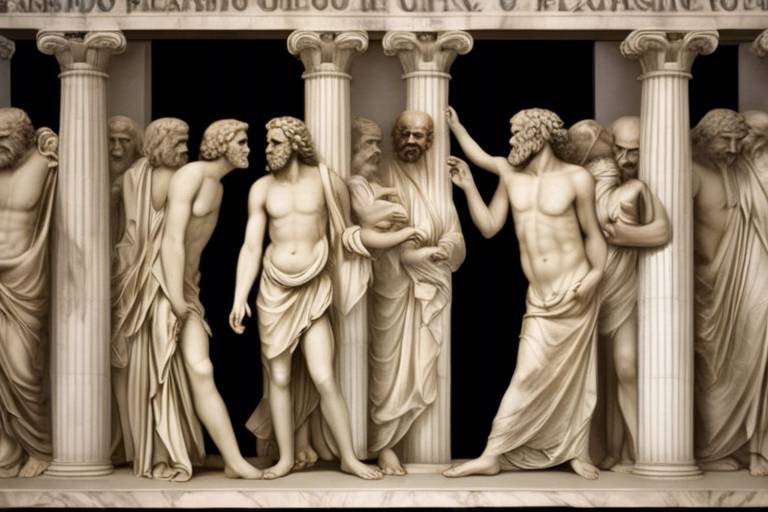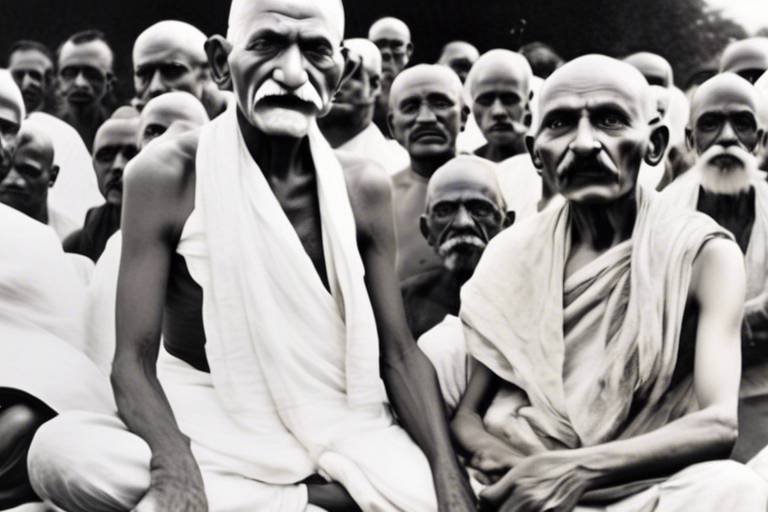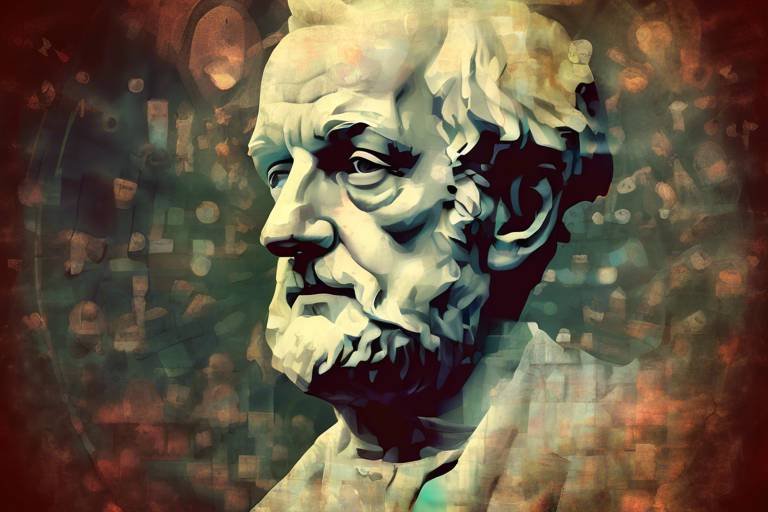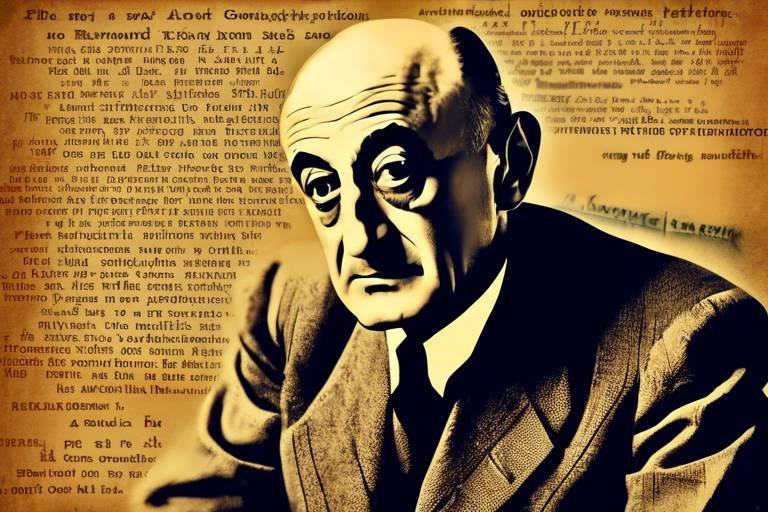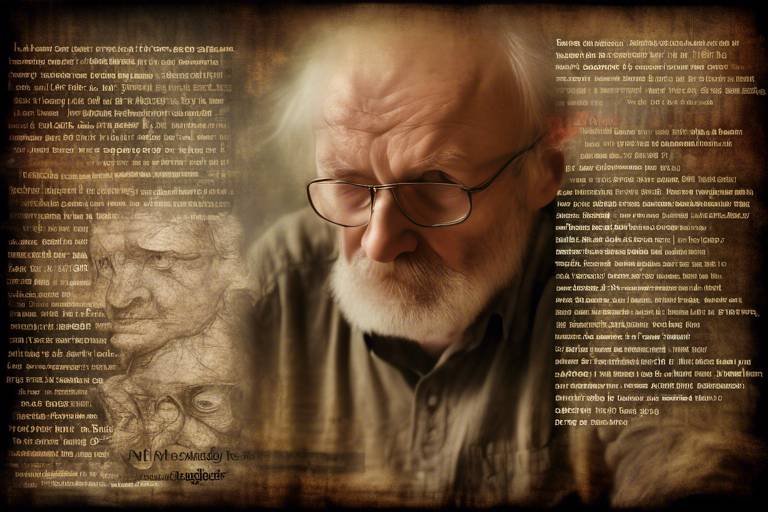Georg Lukacs’s Contributions to Marxist Philosophy
Georg Lukacs stands as a towering figure in the landscape of Marxist philosophy, and his contributions have sparked debates that continue to resonate in contemporary thought. Born in 1885 in Hungary, Lukacs's intellectual journey was profoundly influenced by the tumultuous social and political upheavals of the early 20th century. His work not only seeks to critique capitalism but also aims to illuminate the complexities of human experience within a capitalist framework. In this article, we will delve into the significant contributions of Lukacs, exploring his key ideas and the lasting impact of his work on modern Marxist thought.
One of the most compelling aspects of Lukacs's philosophy is his concept of reification, which he describes as the process through which social relationships are transformed into objectified forms. This concept serves as a lens through which we can examine the alienation experienced by individuals in capitalist societies. Lukacs argues that this alienation is not merely a personal experience but a systemic issue that affects collective consciousness. By understanding reification, we can better grasp the profound disconnect that individuals feel from their own labor and from each other in a capitalist context.
Additionally, Lukacs emphasizes the importance of class consciousness as a crucial element for the proletariat in recognizing their collective identity and agency. This awareness is not just about understanding one's economic position but also about acknowledging the shared struggles and aspirations that bind individuals together in the fight against capitalist oppression. Lukacs posits that fostering class consciousness can empower individuals to break free from the chains of reification, leading to a more authentic understanding of social relations.
Furthermore, Lukacs's influence extends beyond philosophy into the realms of cultural criticism and literary theory. His work has laid the groundwork for integrating Marxist analysis into cultural studies, highlighting the intricate interplay between culture, ideology, and social class. By exploring how cultural products reflect and shape societal dynamics, Lukacs provides a framework for understanding the role of art and literature in the struggle for social change.
In summary, Georg Lukacs's contributions to Marxist philosophy are both profound and multifaceted. His exploration of reification, class consciousness, and the intersection of culture and ideology has significantly shaped contemporary debates within Marxism. As we continue to grapple with the complexities of capitalism and its effects on human relationships, Lukacs's insights remain relevant and thought-provoking, urging us to seek a deeper understanding of our social reality.
- What is reification according to Lukacs?
Reification is the process by which social relationships are transformed into objectified forms, leading to alienation in capitalist societies.
- How does Lukacs define class consciousness?
Class consciousness is the awareness of one's social and economic position within the class structure, which fosters a sense of collective identity and agency among the proletariat.
- In what ways has Lukacs influenced cultural studies?
His work has integrated Marxist analysis into cultural studies, emphasizing the relationship between culture, ideology, and social class.

Historical Context of Lukacs's Work
To truly appreciate Georg Lukacs' contributions to Marxist philosophy, it's essential to understand the historical context in which he was writing. Born in 1885 in Budapest, Hungary, Lukacs lived through a period of immense political upheaval and social transformation. The early 20th century was marked by the decline of the Austro-Hungarian Empire, the rise of industrial capitalism, and the burgeoning labor movements that sought to address the inequities of capitalist society. These elements not only shaped Lukacs's worldview but also provided a fertile ground for his revolutionary ideas.
During this tumultuous time, Europe was grappling with the consequences of rapid industrialization. The working class was becoming increasingly aware of its exploitation, and this awareness was crucial for Lukacs's concept of class consciousness. He argued that the proletariat needed to recognize its position within the capitalist system to effectively challenge the status quo. This realization was not merely an academic exercise for Lukacs; it was a call to action, urging workers to unite and confront the oppressive structures around them.
Moreover, the backdrop of World War I and the subsequent Russian Revolution of 1917 had a profound impact on Lukacs's thinking. The war exposed the brutal realities of capitalism and imperialism, while the revolution offered a glimpse of a potential alternative. Lukacs was particularly influenced by the idea that a revolutionary movement could emerge from the discontent of the masses, and he sought to articulate this in his writings. He believed that the failure of the bourgeoisie to address the needs of the working class would inevitably lead to a revolutionary crisis.
In his early work, History and Class Consciousness, published in 1923, Lukacs explored these themes in depth. He emphasized the necessity of understanding the totality of social relations, arguing that individuals cannot be isolated from the broader economic and social structures that shape their lives. This holistic approach was a significant departure from the more fragmented views of Marxism that preceded him, and it laid the groundwork for a more comprehensive understanding of class struggle.
Furthermore, Lukacs's philosophical influences were diverse, drawing from Hegelian dialectics, Marxism, and even existentialism. He was particularly interested in the dialectical method, which he believed could be used to analyze the contradictions inherent in capitalist societies. By applying this method, Lukacs aimed to demonstrate how capitalism alienates individuals from their true essence, reducing them to mere commodities in a market-driven world.
In summary, the historical context of Georg Lukacs's work is crucial for understanding his contributions to Marxist philosophy. The political, social, and economic upheavals of his time not only informed his ideas but also inspired a generation of thinkers who sought to challenge the capitalist order. His emphasis on class consciousness, reification, and totality continues to resonate within contemporary Marxist thought, making his work as relevant today as it was in the early 20th century.

Key Concepts in Lukacs's Philosophy
Georg Lukacs, a towering figure in Marxist thought, introduced several key concepts that not only shaped his interpretation of Marxism but also left a lasting impact on contemporary social theory. Among these concepts, reification, class consciousness, and totality stand out as pivotal elements that are essential for understanding his philosophical contributions. Each of these concepts serves as a lens through which we can analyze the complexities of capitalist society and the human condition within it.
The concept of reification is particularly significant in Lukacs's work. It refers to the process by which social relations become objectified, transforming human interactions into mere commodities. This transformation leads to a profound sense of alienation, as individuals begin to perceive their relationships and even their own identities through the lens of market value. In a capitalist society, where everything is commodified, reification manifests in various ways, such as the way we view our labor, our relationships, and even our emotions as products to be bought and sold. This perspective not only distorts human experience but also creates a barrier to genuine social connections, trapping individuals in a cycle of isolation.
To illustrate the implications of reification, consider the following table that summarizes its effects on social relations:
| Aspect | Reified Perspective | Authentic Perspective |
|---|---|---|
| Labor | Seen as a commodity | Valued as a human contribution |
| Relationships | Measured by market value | Fostered through genuine connection |
| Identity | Defined by social status | Defined by personal values |
By recognizing these distortions, Lukacs argues that it is possible to cultivate a sense of class consciousness. This concept refers to the awareness of one's social class and the collective identity that arises from shared experiences of oppression. For Lukacs, class consciousness is crucial for the proletariat, as it empowers them to see their common struggles against capitalist exploitation. When individuals understand their position within the class structure, they can begin to organize and mobilize for change. This realization is not merely an intellectual exercise; it is a call to action, urging the working class to unite and challenge the status quo.
Another essential concept in Lukacs's philosophy is totality. This idea emphasizes the interconnectedness of social phenomena and the need to consider the broader context when analyzing specific issues. Lukacs believed that to fully understand any aspect of society, one must examine it within the framework of the entire social system. This holistic approach allows for a deeper comprehension of how economic, political, and cultural factors interact and shape human experiences. In a world where issues are often viewed in isolation, Lukacs's notion of totality serves as a reminder that everything is interrelated.
In summary, the key concepts in Lukacs's philosophy—reification, class consciousness, and totality—offer profound insights into the nature of capitalist society and the human condition. By engaging with these ideas, we can better understand the complexities of our social world and the potential for transformative change. Lukacs's work encourages us to look beyond the surface and recognize the underlying structures that shape our lives, fostering a more profound awareness of our collective struggles.
- What is reification?
Reification is the process by which social relations are transformed into objectified forms, leading to alienation and a commodified view of human interactions. - Why is class consciousness important?
Class consciousness helps individuals recognize their collective identity and agency, empowering them to organize and fight against capitalist oppression. - What does totality mean in Lukacs's philosophy?
Totality refers to the interconnectedness of social phenomena, emphasizing the need to consider the broader social context when analyzing specific issues.

Reification and Its Implications
Reification is a term that Georg Lukacs used to describe a phenomenon that occurs in capitalist societies, where social relations become objectified, almost as if they are things rather than interactions between individuals. Imagine walking through a bustling market where people are not just exchanging goods but are also exchanging parts of their humanity. This process of reification strips away the personal connections that should ideally exist between individuals, reducing them to mere cogs in a vast economic machine. In this context, people begin to see each other not as fellow human beings but as commodities to be used or traded.
Lukacs argued that this alienation is not just a social problem but a fundamental aspect of capitalist society. When social relationships are transformed into mere objects, the rich tapestry of human interaction becomes frayed. Individuals lose touch with their own agency, as they are forced to navigate a world where everything is commodified. This leads to a sense of disconnection from genuine human experiences, which can have profound implications for mental health and societal cohesion.
To illustrate this point, consider the following table that outlines the different aspects of reification:
| Aspect | Description |
|---|---|
| Objectification | Social relations are perceived as objects, leading to a loss of personal connection. |
| Alienation | Individuals feel disconnected from their own labor and from each other. |
| Commodification | Human experiences and relationships are reduced to market value. |
So, how can we counteract the pervasive effects of reification? Lukacs believed that the answer lies in cultivating class consciousness. By fostering a sense of collective identity, individuals can begin to see beyond the commodified social relations that dominate their lives. This awareness can empower the proletariat to reclaim their agency and challenge the capitalist structures that perpetuate alienation. It's about recognizing that we are not just consumers in a marketplace but active participants in a shared human experience.
Moreover, developing a revolutionary awareness is crucial. This means understanding the systemic nature of capitalism and recognizing the ways in which it shapes our thoughts, behaviors, and relationships. By doing so, individuals can begin to resist the forces of reification and work towards a more authentic understanding of social relations. In essence, the journey to counteract reification is about reconnecting with our humanity and recognizing the value of genuine interaction in a world that often prioritizes profit over people.
- What is reification? Reification is the process by which social relations are transformed into objectified forms, leading to alienation and a disconnection from genuine human interactions.
- How does reification impact society? Reification results in individuals perceiving social relationships as mere commodities, which can lead to feelings of alienation and a lack of personal agency.
- What can be done to counteract reification? Cultivating class consciousness and revolutionary awareness can help individuals recognize their collective identity and challenge the capitalist structures that perpetuate alienation.
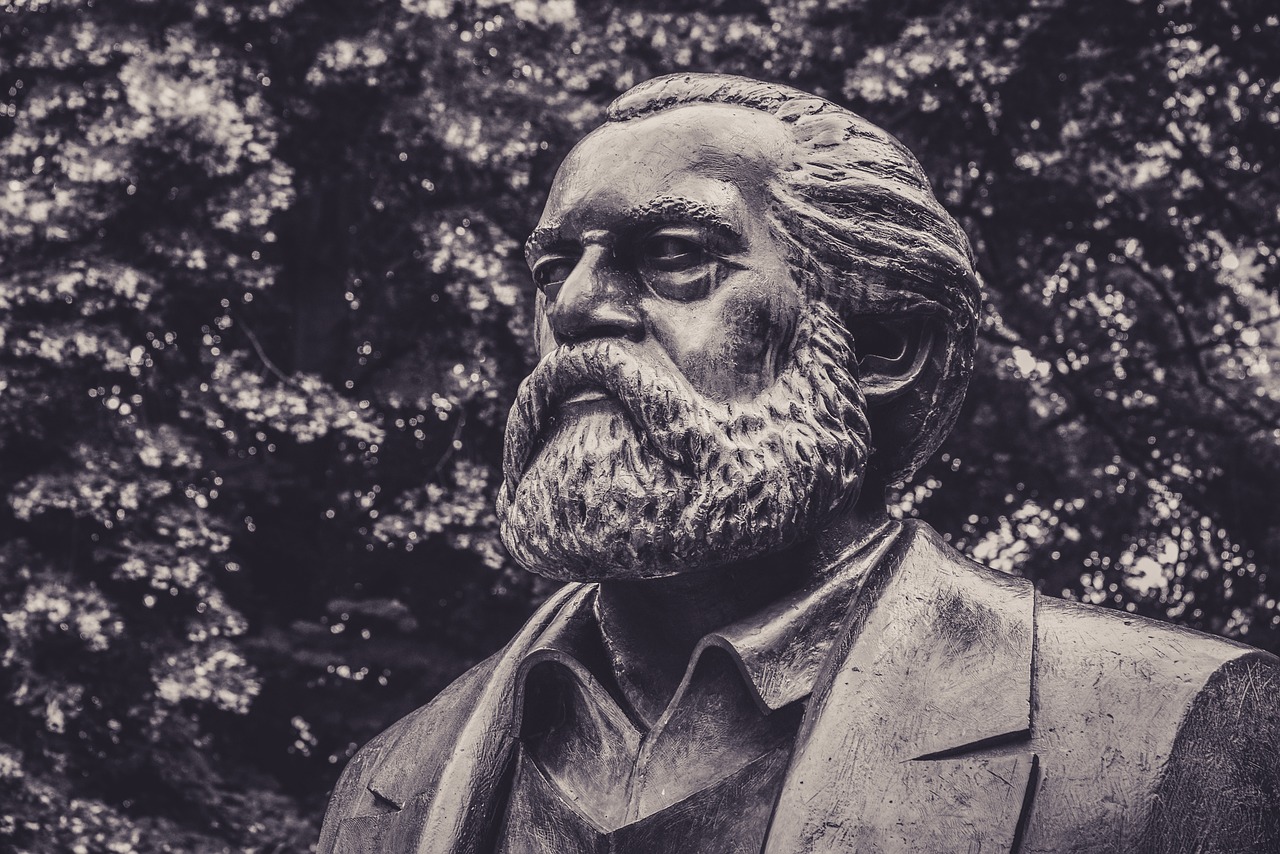
Reification in Capitalist Society
In a capitalist society, the concept of reification plays a pivotal role in shaping how individuals perceive their social relationships. Imagine walking through a bustling marketplace where every interaction feels transactional. This is the essence of reification, where social relations are reduced to mere commodities. People become objects in a vast economic machine, losing touch with the rich tapestry of human experience. The once vibrant connections between individuals are overshadowed by the cold, hard reality of market exchanges.
As Georg Lukacs pointed out, this transformation leads to a profound sense of alienation. Rather than engaging with one another as fellow human beings, individuals start to see each other through the lens of their economic value. For instance, consider the way we often ask, "What do you do?" instead of "Who are you?" This shift in focus from personal identity to economic role illustrates how reification permeates our daily lives, causing a disconnect from genuine human interactions.
Moreover, reification can have far-reaching implications for our mental and emotional well-being. In a society where relationships are commodified, individuals may experience feelings of isolation and disconnection. They might find themselves trapped in a cycle of consumption, where their self-worth is tied to their material possessions rather than their intrinsic human qualities. This phenomenon creates a vicious cycle where the more we engage with commodities, the less we engage with each other.
To further illustrate the impact of reification, consider the following table that outlines some key characteristics of reified relationships versus authentic relationships:
| Reified Relationships | Authentic Relationships |
|---|---|
| Transactional | Mutual |
| Objectifying | Empathetic |
| Surface-level | Deep and meaningful |
| Based on economic value | Based on personal value |
In response to this alienation, Lukacs advocates for a cultivation of class consciousness. He argues that by recognizing their shared experiences and struggles, individuals can begin to combat the effects of reification. This awakening allows people to reclaim their humanity and foster genuine connections with one another. Through collective action and awareness, the proletariat can challenge the status quo and work towards a society where relationships are grounded in authenticity rather than commodification.
In essence, understanding reification in capitalist society is crucial for anyone seeking to navigate the complexities of modern life. By acknowledging the ways in which social relations are objectified, we can begin to seek out more meaningful connections and challenge the systems that perpetuate alienation.

Counteracting Reification
In a world where social interactions often feel like transactions, Georg Lukacs offers a compelling roadmap to counteract the pervasive effects of reification. Reification, the process through which human relationships are reduced to mere commodities, can leave individuals feeling disconnected and alienated from their true selves and each other. But fear not! Lukacs believed that by fostering class consciousness and a revolutionary awareness, we can begin to reclaim our humanity and restore genuine connections.
Imagine walking through a bustling city, surrounded by people who are all engaged in their own little worlds, glued to their devices. This scene encapsulates the essence of reification — where the rich tapestry of human relationships is overshadowed by the cold logic of capitalism. To counter this, Lukacs proposed that individuals need to awaken to their shared experiences and collective struggles. By recognizing their common plight, they can break free from the chains of commodification.
One effective way to cultivate this class consciousness is through education and dialogue. When people come together to discuss their realities, they can identify the systemic forces at play in their lives. This process can be likened to peeling back the layers of an onion; with each layer removed, the core of shared human experience becomes clearer. Thus, education serves as a powerful tool in dismantling the barriers erected by reification.
Moreover, engaging in collective action is crucial. When individuals unite for a common cause, they not only challenge the status quo but also foster a sense of solidarity that transcends the commodified interactions of everyday life. This solidarity can manifest in various forms, such as:
- Participating in community organizing
- Joining labor unions
- Engaging in political activism
These activities not only empower individuals but also serve to reaffirm the importance of human relationships over material possessions. As people come together, they begin to see one another as allies rather than competitors, thus counteracting the isolating effects of reification.
Ultimately, the journey to counteract reification is not a solitary one. It requires a collective effort to foster awareness and build connections. By embracing our shared struggles and working towards a common goal, we can cultivate a more authentic understanding of social relationships, paving the way for a society that values human connection over commodification. In this light, Lukacs's philosophy becomes not just a critique of capitalism but a beacon of hope for a more interconnected and humane future.
- What is reification? Reification is the process by which social relations are transformed into objectified forms, leading to alienation in capitalist societies.
- How can class consciousness help counteract reification? Class consciousness fosters awareness of shared struggles and collective identity, enabling individuals to connect authentically and challenge capitalist oppression.
- What role does education play in counteracting reification? Education facilitates dialogue and understanding, allowing individuals to recognize systemic forces and reclaim their humanity.
- What are some practical ways to combat reification? Engaging in community organizing, joining labor unions, and participating in political activism are effective strategies to foster solidarity and counteract reification.

Class Consciousness and Its Role
Class consciousness is a fundamental concept in Georg Lukacs's philosophy, serving as a beacon for the proletariat in their struggle against capitalist oppression. At its core, class consciousness refers to the awareness that individuals in the working class share regarding their common economic interests and collective identity. This awareness is not merely a passive recognition of one’s socioeconomic status; rather, it is an active and dynamic understanding of the systemic forces at play in society. Lukacs argued that without this consciousness, the working class remains fragmented and vulnerable to the manipulations of the ruling class, which can perpetuate their exploitation.
Imagine a team of players on a soccer field, where each player is focused solely on their individual performance without understanding the game’s overall strategy. In such a scenario, the team is likely to lose against a well-coordinated opponent. Similarly, when workers lack class consciousness, they are unable to unite effectively against the capitalist structures that seek to divide and conquer them. Lukacs believed that fostering class consciousness was essential for the proletariat to recognize their collective power and agency, enabling them to rise against their oppressors.
Moreover, class consciousness allows individuals to transcend their immediate, personal struggles and see them in the larger context of class struggle. This broader perspective is vital for mobilizing collective action. When workers begin to understand that their struggles are not isolated incidents but part of a larger systemic issue, they can organize more effectively. This is where Lukacs's emphasis on the importance of revolutionary awareness comes into play. He argued that through education and political engagement, workers could cultivate a sense of solidarity, which is crucial for any revolutionary movement.
To illustrate the impact of class consciousness, consider the following table that summarizes its effects:
| Aspect | Without Class Consciousness | With Class Consciousness |
|---|---|---|
| Awareness of Exploitation | Limited understanding of personal oppression | Recognition of systemic exploitation |
| Unity | Fragmented individual struggles | Collective action and solidarity |
| Agency | Passive acceptance of conditions | Active pursuit of change |
| Political Engagement | Apathy towards political processes | Involvement in political activism |
In conclusion, class consciousness is not just a theoretical construct; it is a vital tool for the working class to navigate the complexities of capitalist society. By fostering a shared understanding of their plight and potential, workers can transform their individual struggles into a powerful collective force. Lukacs’s insights into class consciousness continue to resonate today, reminding us that awareness is the first step toward meaningful change.
- What is class consciousness? Class consciousness refers to the awareness of one's social class and its interests, particularly among the working class.
- Why is class consciousness important? It is crucial for uniting individuals in the working class to fight against exploitation and oppression.
- How can class consciousness be developed? Through education, political engagement, and shared experiences, workers can cultivate a sense of solidarity and collective identity.
- What role did Georg Lukacs play in Marxist philosophy? Lukacs significantly contributed to Marxist thought by emphasizing the importance of class consciousness and critiquing the effects of capitalism on human relationships.

Lukacs's Influence on Marxist Theory
Georg Lukacs's contributions to Marxist theory are nothing short of revolutionary. His ideas have not only shaped the way we understand Marxism but have also sparked vibrant discussions across various fields, including cultural criticism, literary theory, and political activism. To grasp the full extent of his influence, we must delve into how his key concepts, particularly reification and class consciousness, have been integrated into contemporary Marxist thought.
One of the most significant impacts of Lukacs's work is seen in the realm of cultural studies. By emphasizing the interconnectedness of culture, ideology, and social class, he provided a framework through which scholars could analyze the ways in which cultural products reflect and shape societal dynamics. For instance, his assertion that culture is not merely a backdrop but a battleground for class struggle has inspired a multitude of studies examining how art, literature, and media serve as sites of ideological conflict. This perspective has encouraged researchers to look beyond the surface of cultural artifacts and consider the socio-economic conditions that give rise to them.
Moreover, Lukacs's influence extends to literary criticism. His theories on realism, particularly the idea that literature must reflect the historical and social realities of its time, have reshaped how critics approach texts. By advocating for a Marxist lens in literary analysis, Lukacs challenged readers to consider the socio-political contexts in which works are produced. This has led to a richer understanding of literature as not just an artistic expression but also a reflection of class struggles and societal issues. For example, in analyzing a novel, one might explore how the characters' experiences are shaped by their social conditions, thus revealing deeper truths about the human experience under capitalism.
Furthermore, Lukacs's work has inspired a new wave of political activism. His emphasis on class consciousness as a means for the proletariat to realize their collective identity has resonated with movements seeking to combat capitalist oppression. Activists have drawn from his insights to foster a sense of solidarity among workers, encouraging them to recognize their shared struggles against exploitation. By promoting the idea that awareness of one’s class position is essential for effective political action, Lukacs has provided a theoretical backbone for contemporary movements advocating for social justice and equity.
In summary, Georg Lukacs's influence on Marxist theory is profound and multifaceted. His ideas have not only enriched academic discourse but have also provided practical tools for understanding and challenging the structures of capitalism. As we continue to navigate the complexities of modern society, Lukacs's insights remain relevant, urging us to critically examine the cultural and ideological forces at play in our lives.
- What is reification according to Lukacs? Reification is the process by which social relations are transformed into objectified forms, leading to alienation in capitalist societies.
- How does Lukacs define class consciousness? Class consciousness is the awareness of one's social class and its interests, which is crucial for the proletariat to unite against capitalist oppression.
- What impact did Lukacs have on cultural studies? Lukacs emphasized the relationship between culture, ideology, and social class, providing a framework for analyzing cultural products as reflections of societal dynamics.
- In what ways did Lukacs influence literary criticism? His theories on realism encouraged critics to consider the socio-political contexts of literary works, linking literature to class struggles and historical conditions.
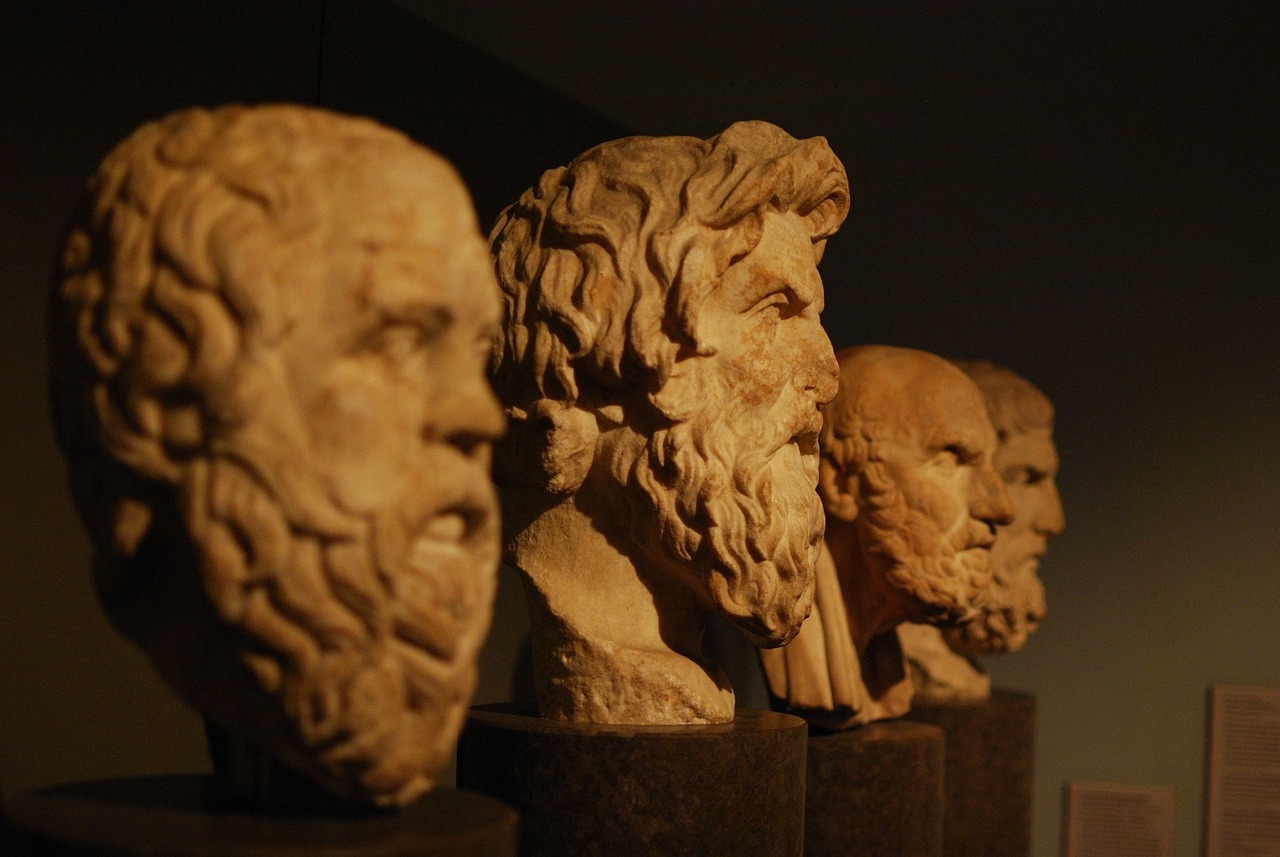
Impact on Cultural Studies
Georg Lukacs's contributions to cultural studies are nothing short of revolutionary. His insights have paved the way for a deeper understanding of the intricate relationship between culture, ideology, and social class. By examining how these elements interact, Lukacs has provided a framework that helps us analyze the complexities of modern society. Imagine trying to navigate a dense forest; without a map, you might get lost. Lukacs acts as that map, guiding us through the tangled underbrush of cultural phenomena.
One of the key aspects of Lukacs's impact on cultural studies is his emphasis on the role of ideology in shaping cultural expressions. He argued that culture is not merely a reflection of social conditions but is also a powerful force that can influence and reinforce those conditions. This duality is crucial for understanding how cultural products—be it literature, art, or media—can both challenge and perpetuate existing power structures.
Furthermore, Lukacs's notion of totality plays a significant role in cultural studies. By advocating for a holistic approach, he encouraged scholars to consider the broader social and historical contexts in which cultural artifacts are produced. This perspective allows for a more nuanced analysis, one that recognizes the interconnectedness of various social forces. For instance, when studying a piece of literature, it becomes essential to examine not only the text itself but also the socio-economic conditions of its time, the author’s background, and the audience's reception.
To illustrate this point, consider the following table that summarizes key elements of Lukacs's influence on cultural studies:
| Key Element | Description |
|---|---|
| Ideology | Culture as a reflection and reinforcement of social conditions. |
| Totality | A holistic approach that considers the broader social context. |
| Class Struggle | Understanding cultural products through the lens of class dynamics. |
| Historical Context | Examining the socio-economic conditions during the creation of cultural artifacts. |
In addition, Lukacs's work has inspired a generation of cultural theorists to explore the implications of class struggle within cultural contexts. This exploration has led to a richer dialogue about the ways in which cultural narratives can serve as sites of resistance against oppression. For example, many contemporary cultural critics draw upon Lukacs's ideas to analyze how marginalized voices can reshape dominant narratives, thereby challenging the status quo.
Ultimately, Lukacs's legacy in cultural studies is characterized by a profound understanding of the interplay between culture and society. His work encourages us to question the cultural products we consume and to recognize their potential for both reinforcing and challenging existing power dynamics. In a world where culture often seems to be commodified and stripped of its deeper meanings, Lukacs's insights remind us of the importance of critical engagement with the cultural landscape.
- What is the significance of Georg Lukacs in cultural studies?
Lukacs's work provides a framework for understanding the interplay between culture, ideology, and social class, emphasizing the importance of historical context in analyzing cultural artifacts.
- How did Lukacs influence Marxist literary criticism?
His theories on realism and the social context of literary production have shaped Marxist literary criticism, highlighting the connection between literature and societal conditions.
- What does totality mean in Lukacs's philosophy?
Totality refers to the holistic approach of considering the broader social and historical contexts in which cultural products are created, allowing for a more nuanced understanding of their significance.

Literary Contributions and Marxism
Georg Lukacs's literary contributions are pivotal in the realm of Marxist thought, particularly when it comes to understanding how literature interacts with social realities. His theories on realism have fundamentally altered the landscape of Marxist literary criticism, providing tools for analyzing texts through the lens of class struggle and social context. Lukacs argued that literature is not merely an artistic endeavor; it is a reflection of the historical and social conditions of its time. This perspective invites readers to see beyond the surface of literary works and to understand the deeper implications of the narratives presented.
One of the central ideas that Lukacs introduced is the concept of social realism. He posited that literature should strive to represent the complexities of social life, particularly the lives of the working class. By emphasizing the importance of the socio-economic context, Lukacs encouraged writers to engage with the realities of their society, thus fostering a deeper connection between literature and the struggles of the proletariat. This approach not only enriches the reading experience but also serves as a form of activism, as literature can challenge dominant ideologies and inspire change.
In his seminal work, The Theory of the Novel, Lukacs elaborates on the relationship between form and content in literature. He critiques the fragmentation often seen in modernist literature, arguing that such fragmentation can obscure the social realities that novels should address. For Lukacs, a coherent narrative structure is essential for conveying the totality of human experience, thus enabling readers to grasp the interconnectedness of individual lives and societal forces. This insistence on a unified narrative reflects his broader philosophical commitment to the idea of totality, which is crucial for understanding the complexities of social phenomena.
Moreover, Lukacs's influence extends to contemporary literary criticism, where his ideas continue to resonate. Many modern critics draw upon his theories to analyze how literature reflects and shapes societal values. For instance, the incorporation of Marxist analysis in examining popular culture and media can be traced back to Lukacs's foundational concepts. His emphasis on the role of ideology in literature has opened up avenues for exploring how narratives can reinforce or challenge prevailing power structures.
To illustrate the impact of Lukacs's theories, consider the following table that outlines key aspects of his literary contributions:
| Key Concept | Description |
|---|---|
| Social Realism | Literature should reflect the social conditions and struggles of the working class. |
| Unity of Form and Content | A coherent narrative structure is necessary to convey the totality of human experience. |
| Critique of Modernism | Fragmentation in literature obscures the social realities that should be addressed. |
| Influence on Contemporary Criticism | His ideas continue to inform Marxist analysis in literature and popular culture. |
In conclusion, Georg Lukacs's contributions to Marxist literary theory are not just historical footnotes; they are vibrant and essential to understanding how literature can engage with the world. By advocating for a literature rooted in social reality, he has provided a framework that allows for the exploration of the intricate relationship between art and society. His legacy endures as scholars and writers alike draw upon his insights to navigate the complexities of contemporary cultural landscapes.
- What is Georg Lukacs known for?
Lukacs is known for his contributions to Marxist philosophy, particularly in the areas of literary theory and social realism. - How did Lukacs influence literary criticism?
He emphasized the importance of social context and class struggle in literature, shaping Marxist literary criticism. - What is the significance of social realism in Lukacs's work?
Social realism is significant as it calls for literature to reflect the realities of the working class and engage with societal issues. - How does Lukacs's concept of totality apply to literature?
Totality refers to the interconnectedness of individual experiences and societal forces, which should be represented in coherent narratives.
Frequently Asked Questions
- What is Georg Lukacs known for in Marxist philosophy?
Georg Lukacs is renowned for his profound contributions to Marxist philosophy, particularly his concepts of reification, class consciousness, and totality. His work critically examines the alienation experienced in capitalist societies and emphasizes the importance of recognizing collective identity among the proletariat.
- How did historical context influence Lukacs's ideas?
The historical backdrop of the early 20th century, marked by rapid industrialization and class struggle, significantly shaped Lukacs's perspectives. His critiques of capitalism were deeply rooted in the socio-political realities of his time, which influenced his philosophical inquiries into the nature of human relationships and societal structures.
- What does reification mean in Lukacs's philosophy?
Reification, in Lukacs's view, refers to the process where social relations are transformed into objectified forms, leading individuals to perceive relationships as mere commodities. This concept highlights the alienation and disconnection from authentic human experiences that individuals face in capitalist societies.
- How can reification be counteracted according to Lukacs?
Lukacs proposed that fostering class consciousness and revolutionary awareness can help counteract the effects of reification. By cultivating a deeper understanding of social relations, individuals can reconnect with their genuine humanity and challenge the alienating forces of capitalism.
- What role does class consciousness play in Lukacs's philosophy?
Class consciousness is central to Lukacs's philosophy, as it empowers the proletariat to recognize their collective identity and agency. This awareness is crucial for mobilizing against capitalist oppression and fostering a unified struggle for social change.
- How has Lukacs influenced cultural studies?
Lukacs's work laid the foundation for integrating Marxist analysis into cultural studies. His insights into the relationship between culture, ideology, and social class have been instrumental in understanding the dynamics of societal structures and cultural production.
- What impact did Lukacs have on Marxist literary criticism?
His theories on realism have significantly shaped Marxist literary criticism, emphasizing the importance of social context and historical conditions in understanding literary works. Lukacs argued that literature cannot be divorced from the socio-economic realities of its time, making his contributions vital for literary analysis.





